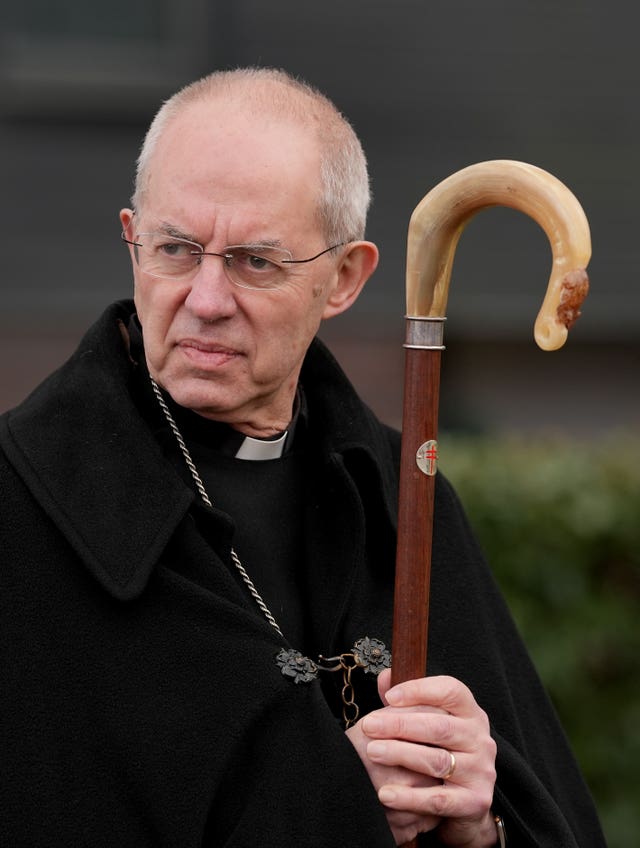Justin Welby: Quitting is in best interests of church I dearly love
John Smyth abused boys and young men for decades and an independent review concluded the Archbishop should have alerted authorities in 2013.

The Archbishop of Canterbury said his resignation after days of pressure following a damning report into abuse cover-up is in the best interests of the Church of England.
Justin Welby said he was quitting “in sorrow with all victims and survivors of abuse”, less than a week after an independent review concluded the most prolific serial abuser to be associated with the church might have been brought to justice had the Archbishop formally reported him to police a decade ago.
Mr Welby had apologised for his failures regarding the John Smyth case – which saw more than 100 boys and young men abused over five decades – but initially declined to resign.
Announcing on Tuesday that he had sought permission from the King to resign, Mr Welby said the past few days had “renewed my long felt and profound sense of shame at the historic safeguarding failures of the Church of England”.
In the days following the publication of the Makin Review, a range of people, from the Bishop of Newcastle to abuse victims and members of the General Synod – the Church of England’s parliament – insisted that Mr Welby’s position had become “untenable”, with a petition urging him to stand down gathering thousands of signatures.
Five days after the review’s publication, Mr Welby said he had decided to step down “in the best interests of the Church of England, which I dearly love and which I have been honoured to serve”.
He said: “The Makin Review has exposed the long-maintained conspiracy of silence about the heinous abuses of John Smyth.
“When I was informed in 2013 and told that police had been notified, I believed wrongly that an appropriate resolution would follow.
“It is very clear that I must take personal and institutional responsibility for the long and retraumatising period between 2013 and 2024.”

Archbishop of York Stephen Cottrell said it was “the right and honourable thing to do” for Mr Welby to have “decided to take his share of responsibility for the failures identified by the Makin Review”, while Bishop of London Dame Sarah Mullally said the move “provides the urgent impetus we need to change the face of safeguarding in the Church of England”.
Survivors of Smyth’s abuse were said to be “hugely emotional” on hearing of the resignation, with author Andrew Grayston – who wrote a book on Smyth’s abuse – saying a number of them told him they felt Mr Welby “had to go because of his failures, but it doesn’t begin to make things right”.
Over five decades between the 1970s until his death, Smyth is said to have subjected as many as 130 boys and young men in the UK and Africa to traumatic physical, sexual, psychological and spiritual attacks, permanently marking their lives.
A lay reader who led Christian summer camps, Smyth died aged 75 in Cape Town in 2018 while under investigation by Hampshire Police, and was “never brought to justice for the abuse”, the review said.

Mr Welby knew Smyth because of his attendance at Iwerne Christian camps in the 1970s, but the review said there was no evidence that he had “maintained any significant contact” with the barrister in later years.
The Archbishop said he had “no idea or suspicion of this abuse” before 2013.
The report said Smyth “could and should have been formally reported to the police in the UK, and to authorities in South Africa (church authorities and potentially the police) by church officers, including a diocesan bishop and Justin Welby in 2013″.
One of the Synod members behind the petition calling for Mr Welby’s resignation said he was “deeply saddened” by what had happened.
The Rev Dr Ian Paul told the PA news agency: “I’m saddened that this episode has come up, I’m grieved for the victims, the survivors and that they’ve had to go through this again.
“I think it’s very sad that this whole episode has happened, I think it’s sad that the Makin Report had to happen, and I think it’s sad that it’s taken so long for meaningful action to take place.
“If I’m pleased about anything it’s that Justin has taken himself at his own words. I’ve never been interested in picking on somebody or tokenism or scapegoating.”
He said he hoped “this is the first step towards the kind of cultural change in senior leadership that the Makin Review is pointing us towards”.
Dr Joanne Grenfell, the Church of England’s lead safeguarding bishop, said the failings identified in the Makin Report into Smyth’s abuse meant it was “now necessary for others to take up the baton” on safeguarding.
She described her “sadness” at news of Mr Welby’s resignation but said she respected and understood it.
Sir Keir Starmer “respects the decision” of Mr Welby to step down, Downing Street said, adding that it was a matter for the Church of England and the Archbishop.
The Prime Minister is not believed to have spoken to Mr Welby before he announced his resignation.
The Archbishop said he would honour his existing “constitutional and church responsibilities”, so exact timings for his departure will be decided “once a review of necessary obligations has been completed”.





